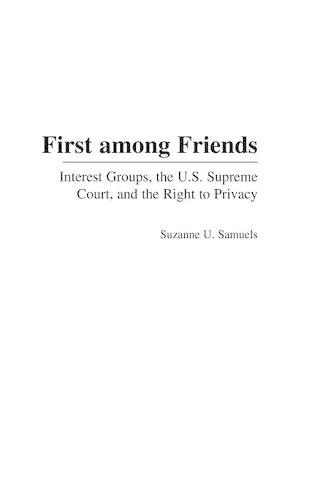
First among Friends: Interest Groups, the U.S. Supreme Court, and the Right to Privacy
(Hardback)
Publishing Details
First among Friends: Interest Groups, the U.S. Supreme Court, and the Right to Privacy
By (Author) Suzanne U. Samuels
Bloomsbury Publishing PLC
Praeger Publishers Inc
30th September 2004
United States
Classifications
General
Non Fiction
Politics and government
347.7326
Physical Properties
Hardback
300
Description
In the last several decades, there has been an explosion in the number of amici curiae, or friend of the Court, briefs filed with the U.S. Supreme Court. Amici are not formal parties to a lawsuit, but file to help inform the Justices about the wider repercussions of the case before them. Public law scholars have long discussed whether these briefs have an impact on the Justices. This book is the first study that seeks to assess the extent of amici influence. This work examines the role of interest groups in the creation and interpretation of the right to privacy, a highly controversial right that derived almost entirely from case law. It looks at amici participation in abortion, aid in dying, family relationships, and anti-sodomy cases. This volume tracks the influence of amici arguments and data on the Justices' handling of these cases.
Reviews
Many pundits consider the Supreme Court far from the "least dangerous branch" and the most undemocratic of America's triumvirate of political institutions. Likewise, the activity of lobbying groups throughout the US political system has gained great notice in recent decades. Many consider the policy outputs of these groups to be antithetical to democracy. Samuels combines these two streams of research by examining the role of interest groups in "right to privacy" cases heard before the Supreme Court. In particular, she examines whether and how amicus briefs written by various groups have worked to affect the Court's rulings. This is important given the externality of most groups as litigants in Supreme Court cases. Samuels finds that the data and arguments provided in amicus briefs serve to sway the justices in ways not discussed during oral arguments. She further concludes that the justices do have "favorites" when it comes to interest groups, and their arguments have certainly influenced privacy decisions. This book should be read by students of the Court and those studying the role of interest groups (particularly how groups lobby in a nonlegislative setting). Recommended. Upper-division undergraduates and above.-Choice
"Many pundits consider the Supreme Court far from the "least dangerous branch" and the most undemocratic of America's triumvirate of political institutions. Likewise, the activity of lobbying groups throughout the US political system has gained great notice in recent decades. Many consider the policy outputs of these groups to be antithetical to democracy. Samuels combines these two streams of research by examining the role of interest groups in "right to privacy" cases heard before the Supreme Court. In particular, she examines whether and how amicus briefs written by various groups have worked to affect the Court's rulings. This is important given the externality of most groups as litigants in Supreme Court cases. Samuels finds that the data and arguments provided in amicus briefs serve to sway the justices in ways not discussed during oral arguments. She further concludes that the justices do have "favorites" when it comes to interest groups, and their arguments have certainly influenced privacy decisions. This book should be read by students of the Court and those studying the role of interest groups (particularly how groups lobby in a nonlegislative setting). Recommended. Upper-division undergraduates and above."-Choice
Author Bio
SUZANNE U. SAMUELS is Associate Professor of Political Science at Seton Hall University. She has written widely in the area of law, politics and society, and is keenly interested in the interplay of law and social and political institutions.
